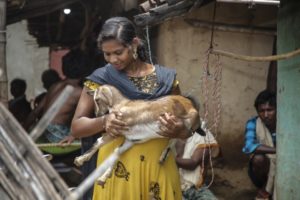Bolangir: Breaking free from the shackles of the debt-bondage in a brick-kiln in Tamil Nadu, the gutsy 19-year-old tribal girl, Manasi Bariha has landed up as a casual farm labourer in her village, struggling to make ends meet.
Recently, her rare display of courage and presence of mind which helped rescue 6,000 other labourers trapped in different brick-kilns in Tamil Nadu during the COVID-19 pandemic, garnered applause from various sectors.
Manasi, who hails from Matiabhata village under Khaprakhol block of the district, said, “Back there, we used to work from 4:30 am to 10:30 am and again from 3 pm to 10:30 pm and were paid Rs 250-300 as daily wage. Now we work from 7 am to 5 pm and are paid the same amount. It seems as if we were born to be caught in the cycle for the debt-bondage.”
She further said despite all the media attention after her rescue act, her family has not received any support from the government. “Many people were recently provided houses under PM Awas Yojana but we are deprived of it despite having necessary document,” she said.
Narrating the tough times she has endured since her childhood, Manasi said my mother succumbed to TB eight years ago. In order to pay off the debts incurred for her medical expenses, her father took a loan of Rs 28,000 mortgaging their 1.5-acre land.
With no land, their survival was at stake. With no help in sight, Manasi’s father had to engage her and her younger sister as bonded labour. “We need Rs. 30,000 to get back our land. For the past eight years, we have been working as bonded labourers in different states,” she said.

Despite the shadows of the debt and bonded labour, Manasi has not lost hope. Though she could study upto Class VIII, she wishes that her younger sister should pursue her studies. “I wanted to become a nurse but discontinued the studies due to the unfortunate circumstances. I don’t want my sister to be trapped in the same situation,” she said.
Block Development Officer (BDO) of Khaprakhol, Tarini Suna, said, “The District Labour Officer and I had conducted an inquiry into the condition of Manasi and her family. We also submitted a report to the collector mentioning financial assistance for land development and housing by the family.”
Stating that the family could not be allotted a house as Manasi’s father was not enlisted in the SECC list for NREGA, the BDO said a labour card and Rs 30,000 have been issued to them on Monday. But Manasi denied to have received any such help.
Though the BDO claimed that Manasi’s family can benefit from MGNREGA, she has a different version. Since the NRGEA works are offered after the monsoon months, it overlaps with the months when they have to migrate to work in the kilns for the loan taken by them, she said.
So long as the people like Manasi’s family remain far away from the economic and social security of the government, the vice-like grip of poverty-loan-bonded labour cycle will continue roll on. Manasi may stand up to the situation for her courage and tenacity, but not all are Manasis.



